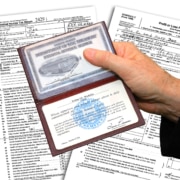How Long Can the IRS Try to Collect a Debt?
The Collection Statute Expiration Date, Explained
Most people assume that once they owe the IRS money, they are required to pay them until the debt is fully resolved, no matter how long it’s been since the debt originated. Luckily for them, that’s not necessarily true.
In general, the IRS has 10 years after the date of assessment to collect on delinquent taxes and tax-related fees, although there are a few exceptions. This 10-year limit is known as the collection statute expiration date (CSED), and it frees tens of thousands of Americans from their tax liabilities every year.
However, the closer you get to the CSED, the more aggressive the IRS’ collection efforts become. This means you need to carefully consider any sort of installment agreement, preferably with help from an experienced certified tax resolution specialist (CTRS), before signing on the dotted line.
About the IRS Limitations Period
The 10-year limitations period begins on the date of last assessment, which is also the date the IRS submits and signs the applicable form. This will be the same date as the one on the formal notice you receive from the IRS which details the amount you owe on your annual income taxes.
If you didn’t file a return, the IRS may force you to file or create one on your behalf that includes a deficiency assessment. In these instances, the date on this document will begin the 10-year limitations period.
Collections Suspensions Can Lengthen the IRS’ Window to Collect
The date of your CSED can exceed 10 years from the initial assessment if the IRS has to suspend collections at any time, which can happen if the IRS is not legally allowed to pursue collection actions against you for some reason.
For example, if you have filed for bankruptcy and the court issues a stay that prevents the IRS from taking collection action, the window toward your CSED will stop tolling. This suspension period will last the duration of the bankruptcy proceedings plus an additional six months.
Other examples include the time period during which the IRS considers installment agreements, offers in compromise, and innocent spouse relief. The IRS will also suspend collections if you live outside the United States for at least six consecutive months, and the window of collections won’t resume until you return.
RELATED: How Can I Get More Time to Pay My IRS Bill?
Lastly, the IRS can extend the CSED by suing the taxpayer in federal court, although this almost never happens. During these suspension periods, no time is accrued toward the 10-year limitations period.
In general, you should speak with an experienced CTRS if you have questions about how to determine your CSED.
Choosing to Extend the Limitations Period
In some cases, the IRS successfully convinces people to voluntarily extend the 10-year limitations period. Prior to 1998, the IRS placed a great deal of pressure on individuals to do this. If taxpayers refused, the IRS would begin making threats.
Thankfully, lawmakers deemed this practice illegal in 1998, but the IRS still finds creative ways to get taxpayers to extend the limitations period. For instance, by entering an installment agreement, taxpayers are usually required to waive the 10-year limitations period. The extension cannot exceed six years, but it is a useful tool for the IRS in their collection efforts.
When the standard 10-year limitations period is almost over, the IRS will frequently offer appealing installment agreements to get taxpayers to voluntarily extend the deadline, especially if the taxpayer still owes a substantial amount. Because of these types of tactics, you should speak with the experienced tax attorneys at S.H. Block Tax Services before signing any installment agreement.
Contact S.H. Block Tax Services for Help Resolving Your Tax Issues
Confronting complex tax issues alone can be intimidating and overwhelming. When you work with S.H. Block Tax Services to resolve your tax problems, however, we assume responsibility for your claim. We will communicate directly with the IRS and field all requests that come from their office. We can then counsel you about your best options and offer sound advice and promising solutions to your tax issues.
If you have any questions, we would love the chance to speak with you and provide our professional insight. We offer free consultations and have helped thousands of taxpayers resolve their tax issues. Please contact us today by completing this form or calling us at (410) 872-8376.
The content provided here is for informational purposes only and should not be construed as legal advice on any subject. Please read our full disclaimer here.








Leave a Reply
Want to join the discussion?Feel free to contribute!